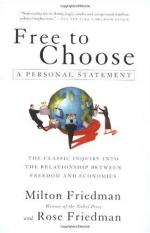|
This section contains 1,190 words (approx. 3 pages at 400 words per page) |

|
Chapter 2, The Tyranny of Controls Summary and Analysis
Common sense dictates that people buy from others when they can't produce a product as cheaply as someone else can. It also makes sense to buy at the lowest price and sell at the highest price. Every entity acts in its own best interest, which differs from that of others. Smith claims that the result is a maze of rules and regulations that cause problems. Everyone would be better off without the rules and regulations that restrict the market. He uses free trade as an example. Tariffs and other forms of controls cause more harm than good. Eventually these interferences and controls expand into the domestic market, and society is worse off than they would have been otherwise.
In the 1930s, the United States enacted the Smoot-Hawley Tariffs, which raised tariffs to their...
(read more from the Chapter 2, The Tyranny of Controls Summary)
|
This section contains 1,190 words (approx. 3 pages at 400 words per page) |

|




